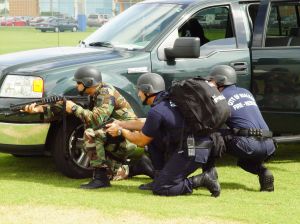 All of us have had the experience of being called to the principal’s office. Well, most of us. Many juvenile delinquent conduct investigations begin this way, with a call and questioning by the principal, a search of a student’s locker or purse, or a pat down of a student suspected to be in contraband. Our first thought as Americans would assume that a student at a school has the same Fourth Amendment protection against unreasonable searches and seizures as an adult, but that isn’t quite so. The Supreme Court directly addressed this issue in New Jersey v. T.L.O., 469 U.S. 325.
All of us have had the experience of being called to the principal’s office. Well, most of us. Many juvenile delinquent conduct investigations begin this way, with a call and questioning by the principal, a search of a student’s locker or purse, or a pat down of a student suspected to be in contraband. Our first thought as Americans would assume that a student at a school has the same Fourth Amendment protection against unreasonable searches and seizures as an adult, but that isn’t quite so. The Supreme Court directly addressed this issue in New Jersey v. T.L.O., 469 U.S. 325.
In T.L.O., a principal had searched a student’s purse and found marijuana, cigarettes, money and drug notes after information from a teacher that the student was smoking cigarettes in the bathroom and in possession of cigarettes against school rules. The Supreme Court upheld the search, stating that different standards apply to searches of students by school officials than searches by police and held:
“We join the majority of courts that have examined this issue in concluding that the accommodation of the privacy interests of school children with the substantial need of teachers and administrators for freedom to maintain order in the schools does not require strict adherence to the requirement that searches be based on probable cause to believe that the subject of the search has violated or is violating the law. Rather, the legality of a search of a student should depend simply on the reasonableness, under all the circumstances, of the search. Determining the reasonableness of any search involves a twofold inquiry: first, one must consider ‘whether the …action was justified at its inception…; second, one must determine whether the search as actually conducted was ‘reasonably related in scope to the actual circumstances which justified the interference in the first place.'”
 Sherman & Plano, TX Criminal Defense Lawyer Blog
Sherman & Plano, TX Criminal Defense Lawyer Blog



 Section 15.02 of the Texas Penal Code makes criminal conspiracy a crime one level lower than the actual substantive offense. It states: “(a) A person commits criminal conspiracy if, with intent that a felony be committed: (1) he agrees with one or more persons that they or one or more of them engage in conduct that would constitute the offense; and (2) he or one or more of them performs an overt act in pursuance of the agreement…(d) An offense under this section is one category lower than the most serious felony that is the object of the conspiracy, and if the most serious felony that is the object of the conspiracy is a state jail felony, the offense is a Class A misdemeanor.”
Section 15.02 of the Texas Penal Code makes criminal conspiracy a crime one level lower than the actual substantive offense. It states: “(a) A person commits criminal conspiracy if, with intent that a felony be committed: (1) he agrees with one or more persons that they or one or more of them engage in conduct that would constitute the offense; and (2) he or one or more of them performs an overt act in pursuance of the agreement…(d) An offense under this section is one category lower than the most serious felony that is the object of the conspiracy, and if the most serious felony that is the object of the conspiracy is a state jail felony, the offense is a Class A misdemeanor.” Thus, following the shooting, the police had the right to not only arrest any person they observed shooting weapons at others, they would have the right to conduct a protective sweep of not only the outside of the restaurant, but the inside of the restaurant for persons they believed would be a continuing danger. Any person found to be in possession of a firearm would be in violation of the law if the restaurant, Twin Peaks, sells alcohol and the alcohol accounts for 51% of its revenue. Possessing a firearm, even with a conceal and carry permit, is prohibited on the premises (including the parking lot) of such locations. Any customer possessing a firearm inside the restaurant without a conceal and carry permit would also be subject to arrest.
Thus, following the shooting, the police had the right to not only arrest any person they observed shooting weapons at others, they would have the right to conduct a protective sweep of not only the outside of the restaurant, but the inside of the restaurant for persons they believed would be a continuing danger. Any person found to be in possession of a firearm would be in violation of the law if the restaurant, Twin Peaks, sells alcohol and the alcohol accounts for 51% of its revenue. Possessing a firearm, even with a conceal and carry permit, is prohibited on the premises (including the parking lot) of such locations. Any customer possessing a firearm inside the restaurant without a conceal and carry permit would also be subject to arrest. Each biker shooting at other bikers without justification could be arrested for murder or capital murder. It is capital murder in the state of Texas to unlawfully kill two people in the same criminal episode. However, none of these shooters appear to have been identified in the media. It has also been reported that the police were shooting at people they believed to be wrongfully shooting others, further complicating the scenario. Police and citizens have the right to use deadly force to defend third persons where reasonable, just like any biker present who is in reasonable fear for his life has the right to use deadly force against another to defend himself.
Each biker shooting at other bikers without justification could be arrested for murder or capital murder. It is capital murder in the state of Texas to unlawfully kill two people in the same criminal episode. However, none of these shooters appear to have been identified in the media. It has also been reported that the police were shooting at people they believed to be wrongfully shooting others, further complicating the scenario. Police and citizens have the right to use deadly force to defend third persons where reasonable, just like any biker present who is in reasonable fear for his life has the right to use deadly force against another to defend himself. Last week, all the news circled once again around a Waco, Texas law enforcement situation. Twin Peaks restaurant was apparently hosting a “biker” day, and several motorcycle clubs were in town for a meeting of a council of clubs. One Dallas lawyer said the meeting revolved around legislative issues dealing with motorcycles. However, the local police were suspicious because some groups are labeled as Outlaw Motorcycle Gangs by Texas law enforcement, and police thought the situation was ripe for explosion. One motorcycle club reportedly showed up uninvited, and a fight broke out in the parking lot. We don’t know what exactly happened, but when the shooting stopped, nine bikers were dead. Police then arrested approximately 170 bikers alleging probable cause that they conspired to commit capital murder. A judge has held each on $1 million bonds, which normally requires raising at least $100,000 in cash or other security.
Last week, all the news circled once again around a Waco, Texas law enforcement situation. Twin Peaks restaurant was apparently hosting a “biker” day, and several motorcycle clubs were in town for a meeting of a council of clubs. One Dallas lawyer said the meeting revolved around legislative issues dealing with motorcycles. However, the local police were suspicious because some groups are labeled as Outlaw Motorcycle Gangs by Texas law enforcement, and police thought the situation was ripe for explosion. One motorcycle club reportedly showed up uninvited, and a fight broke out in the parking lot. We don’t know what exactly happened, but when the shooting stopped, nine bikers were dead. Police then arrested approximately 170 bikers alleging probable cause that they conspired to commit capital murder. A judge has held each on $1 million bonds, which normally requires raising at least $100,000 in cash or other security. However, Texas’ public lewdness statute proscribes a wide range of conduct, including the consensual touching of breasts outside the clothing in public. Sec. 21.01. defines: (1) “Deviate sexual intercourse” means: (A) any contact between any part of the genitals of one person and the mouth or anus of another person; or (B) the penetration of the genitals or the anus of another person with an object. (2) “Sexual contact” means, except as provided by Section 21.11, any touching of the anus, breast, or any part of the genitals of another person with intent to arouse or gratify the sexual desire of any person. (3) “Sexual intercourse” means any penetration of the female sex organ by the male sex organ.
However, Texas’ public lewdness statute proscribes a wide range of conduct, including the consensual touching of breasts outside the clothing in public. Sec. 21.01. defines: (1) “Deviate sexual intercourse” means: (A) any contact between any part of the genitals of one person and the mouth or anus of another person; or (B) the penetration of the genitals or the anus of another person with an object. (2) “Sexual contact” means, except as provided by Section 21.11, any touching of the anus, breast, or any part of the genitals of another person with intent to arouse or gratify the sexual desire of any person. (3) “Sexual intercourse” means any penetration of the female sex organ by the male sex organ. Salvador Cisneros came to the United States to realize the American dream, and part of his dream might have ranged from fondling breasts in public to joining the mile high club. Having been discovered in the United States without permission to be here, he applied for a “cancellation of removal” under the Immigration and Nationality Act. Due to his record of being convicted of public lewdness under 21.07 of the Texas Penal Code in 2006, the immigration judge denied his petition categorically, stating that public lewdness was per se a crime involving moral turpitude,and therefore makes one subject to deportation.
Salvador Cisneros came to the United States to realize the American dream, and part of his dream might have ranged from fondling breasts in public to joining the mile high club. Having been discovered in the United States without permission to be here, he applied for a “cancellation of removal” under the Immigration and Nationality Act. Due to his record of being convicted of public lewdness under 21.07 of the Texas Penal Code in 2006, the immigration judge denied his petition categorically, stating that public lewdness was per se a crime involving moral turpitude,and therefore makes one subject to deportation. Kudos to the people of Maryland for finally putting an end to state sanctioned homicide. All life is precious, including the lives of those who may not “deserve” to keep living. But, an interesting thing happened on the way to humanity. What is Maryland to do with its “inventory” of formerly suitable gurney candidates? A recent
Kudos to the people of Maryland for finally putting an end to state sanctioned homicide. All life is precious, including the lives of those who may not “deserve” to keep living. But, an interesting thing happened on the way to humanity. What is Maryland to do with its “inventory” of formerly suitable gurney candidates? A recent  A
A